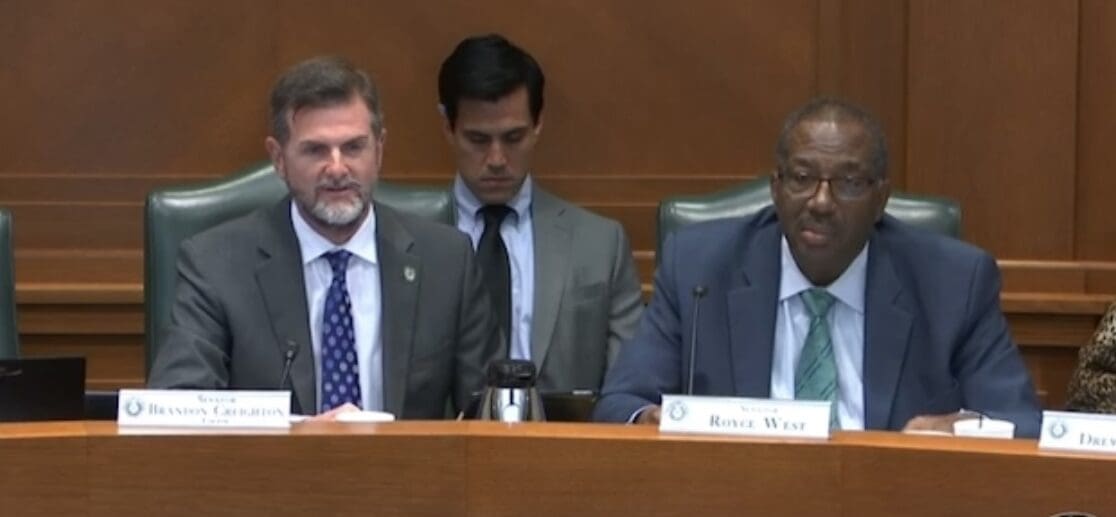Critical race theory is rooted in Marxism and by design leads to division, an expert told a Texas senator this week.
That testimony came at a hearing on legislation that would prohibit taxpayer-funded colleges and universities from using CRT and the related push for “Diversity, Equity, and Inclusion” programs.
During a subcommittee hearing on Senate Bill 16, filed by State Sen. Bryan Hughes (R–Mineola), lawmakers were presented with testimonies of the disruption that CRT and DEI cause in education.
SB 16 would abolish CRT and DEI from college and university classrooms. Hughes said CRT and DEI interfere with students’ academic freedom and prevent them from thinking for themselves, while allowing others to persecute them for not agreeing.
“We want to make sure that rights are respected and discrimination is not taking place,” said Hughes. “Senate Bill 16 would address that.”
SB 16 is one of Lt. Gov. Dan Patrick’s priorities for the legislative session.
The use of CRT has been on the rise for years, gaining traction during the Obama administration and then rising to a national level following George Floyd’s death and Black Lives Matters protests in 2020.
CRT is centered around the ideology that racism is systemic in American institutions because they are based in “white privilege” and “white supremacy.” In attempts to indoctrinate individuals, schools ranging from pre-K to graduate schools have developed and utilized CRT courses, projects, and lessons.
Carol Swain, Ph.D., a distinguished fellow for constitutional studies at the Texas Public Policy Foundation, testified to the Senate subcommittee regarding her views on the bill.
Swain explained that CRT and DEI are both rooted in Marxism and, by design, exist to create conflict.
Continuing her testimony, Swain discussed how DEI is no longer actually about diversity, equity, or inclusivity.
“Diversity used to mean you had people or things from different varieties. Today, diversity is about groups. And it’s about bringing in representatives of certain groups, and they’re maintaining their distinct group identities as opposed to looking at individuals.”
As for equity, Swain said it “now means equal outcomes, not … equal opportunity.”
Swain said she believes CRT “violates the 1964 Civil Rights Act and its prohibitions against discrimination on the basis of race, sex, color, religion, disability, and national origin.”
Another supporter of the bill was Paul Hale, a taxpayer and business owner who spoke of his experience saving money to pay for his son to go to college. Hale explained he and his wife saved for years to send his son to college; however, when the time came for his son to start looking into colleges, he realized all colleges and universities across the state teach “policies of hatred.”
Hale said they saw it for what it was: hate.
“Why would somebody send their kid to a university where the administrations cannot tell the difference between a male and a female and hate everybody that even pretends to, and hates people for the color of their skin?” asked Hale.
“What we are seeing are universities being turned into hate centers, and if students don’t think exactly a certain way, they’re ridiculed and persecuted. We’re seeing it all over the state of Texas,” concluded Hale.
Ethan Smith, a piano teacher, testified in favor of the bill, despite not knowing the bill was specifically about CRT.
“I didn’t even realize this about critical race theory. I just read the text of the bill,” said Smith. “An institution of higher education must be committed to creating an environment of intellectuals, not an environment of diversity just for diversity’s sake.”
Smith explained his qualms with the wording used in the script of the bill, specifically the word “compel.”
“If I’m not compelling my students, I’m not doing my job,” said Smith. “I think that ‘compelling’ is too vague, and I don’t know that ‘compel’ is really the word you want there.”
While only three people spoke in favor of the measure, more than a dozen offered testimony against it.
Antonio Ingram, assistant counsel for the Legal Defense Fund, said, “SB 16 would have a chilling effect on discussions involving race and equity in classrooms [and] it will hurt professors of color and queer professors.”
“There’s evidence that demonstrates that professors of color, black, brown, Latinx, Asian American, indigenous, and queer professors will disproportionately be teaching the courses that are going to be impacted by SB 16 as obviously a direct impact on diverse faculty, who, in many ways, reflect the changing demographics of the state of Texas,” said Ingram.
Ingram said the wording used in this bill was “vague” and “imprecise.”
Carmen Chavez, a professor of Mexican American and Latino studies, said she doesn’t believe professors currently have the capacity to “compel” students to do, believe, or say anything, unlike Senate Bill 16 says.
Others in opposition echoed the testimonies, testifying that the wording used was “overly broad” and “doesn’t make sense.”
Last session, lawmakers enacted legislation to begin the process of ending CRT and DEI in Texas education by banning it in K-12 education. Senate Bill 16 would continue the process by banning CRT and DEI in Texas colleges and universities.
Following the hearing, Senate Bill 16 was left pending in the committee.
No ads. No paywalls. No government grants. No corporate masters.
Just real news for real Texans.
Support Texas Scorecard to keep it that way!





